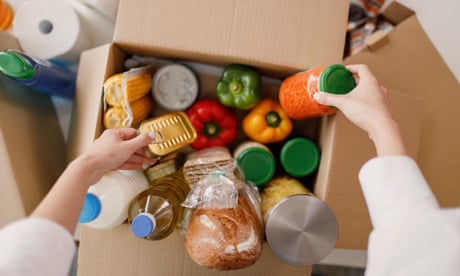- by foxnews
- 08 Apr 2025
‘As bad as it was during lockdown’: NSW food banks battle to keep up with demand
‘As bad as it was during lockdown’: NSW food banks battle to keep up with demand
- by theguardian
- 01 Jul 2022
- in news

If it weren't for a weekly food delivery from the Jesuit Refugee Service, Jasmeen and her family would be going hungry.
Jasmeen, who has asked to remain anonymous, says she and her husband and two teenage children don't receive any government support, and have been struggling with their health and the skyrocketing price of living.
Jasmeen arrived in Australia in 2019 with her husband, her 17-year-old son and 14-year-old daughter, seeking education opportunities for the children, but the family has been hampered by health problems, making work difficult and exacerbating their financial challenges.
But their struggles are not unique.
Community organisations say the situation at food banks in New South Wales is dire, with some families struggling almost as much as they did during Covid lockdowns.
Amid surging prices of groceries, petrol and rent, low income families have been turning to community-organised food banks as a means of easing their financial stress.
JRS operates a food delivery service that is focused on people seeking asylum and migrants in vulnerable situations. Maeve Brown, its assistant country director, warns more people will struggle in the coming months.
"We still don't know what those winter electricity bills will look like for people, and I know people are already concerned that that cost is going to be quite significant.
"We're bracing ourselves for what's going to happen in the next few months with cost of living, cost of groceries going up. We're expecting to see more people asking for food support."
Brown says she is concerned about a reduction in donations as the cost of living bites across the population, reducing the organisation's capacity to support vulnerable people.
"Many of the donations we get are from schools and churches, and if they're also feeling that pressure with cost of grocery items going up, that might limit their ability to donate.
"And if people who are donating can't donate and people who are serving can't afford to shop then we're really going to be in a tough position."
Patrick Soosay, manager at the Harris Park Community Centre, says demand for food parcels has doubled in recent months, matching the demand during the Delta lockdown in western Sydney.
"I think it's probably just as bad as it was during the Covid lockdowns. It's a bit different, because there was a lot more funding and support to get people through," he says.
"Whereas now, those organisations have significantly scaled downwards, meaning there are not as many services around any more. And that significantly impacts people. Many tell us that without our food or support, they will go hungry."
Soosay says the price of groceries has been hurting people the most, with many being unable to provide simple meals at home without community support.
"Groceries is the biggest struggle, people just can't provide good, simple food at home. And coupled with petrol and rent increases, it just means people are struggling.
"And you can see it in their faces when you hand them the food, you can see the tears in their eyes."
Amira Shahid from the Western Sydney Community Centre, which opens its food pantry once a week for anyone who "can't afford to pay", says people from all walks of life are accessing the service.
"People who are single, single parents, seniors, large families, recent migrants, a whole mix of people come, around 20 to 25 each time."
She says families with infants are particularly hard hit.
"Baby formula I would say is one of the biggest challenges. All the baby's needs are currently very expensive, everything is expensive really."
After a rent increase of $20 a week earlier in the year, Jasmeen says she and her family have had to adjust their lives to keep up.
"My children understand the situation, so they don't demand too much, they don't ask to eat out or go to the movies.
"We can't do any of these things.
"I had surgery recently, but I have to keep working, at least four days a week. It's taken such a mental and physical toll."
- by foxnews
- descember 09, 2016
Ancient settlement reveals remains of 1,800-year-old dog, baffling experts: 'Preserved quite well'
Archaeologists have recently unearthed the remarkably well-preserved remains of a dog from ancient Rome, shedding light on the widespread practice of ritual sacrifice in antiquity.
read more


